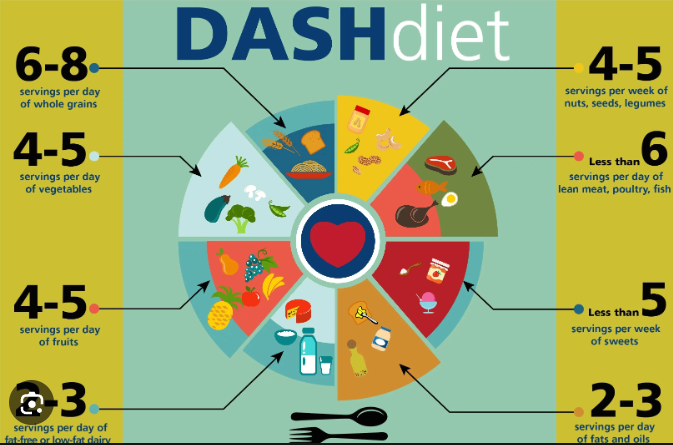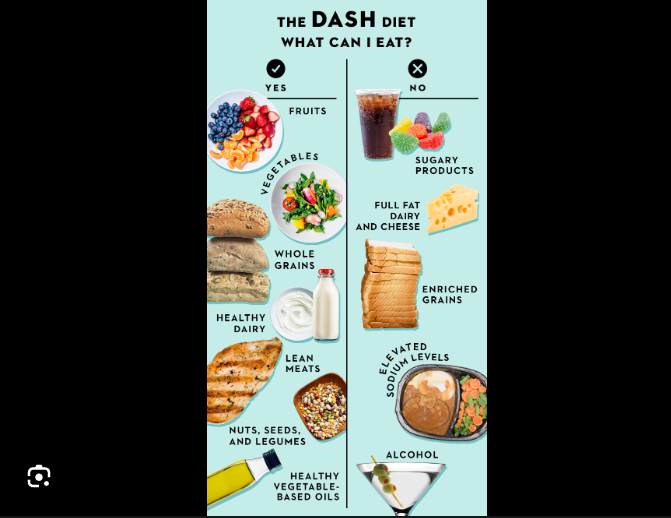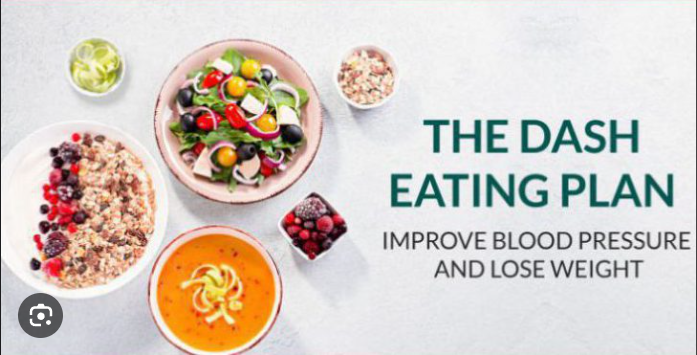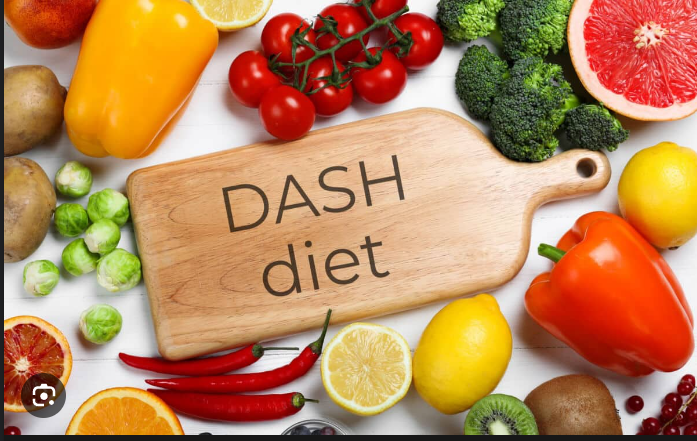The National Heart, Lung, and Blood Institute has endorsed the DASH diet, which stands for dietary approaches to stop hypertension, as a flexible, balanced, and heart-healthy eating strategy to achieve just that: to stop (or avoid) hypertension, often known as high blood pressure. The DASH diet is one of the Best Diets of 2023, according to U.S. News & World Report.
What is the DASH Diet?

Those who seek to prevent or treat high blood pressure are advised to follow the DASH diet plan, which stands for Dietary Approaches to Stop Hypertension. This is accomplished by consuming more fiber and minerals that are good for your heart, such as calcium, potassium, and magnesium, while consuming less sodium and bad fats.
Fruits, vegetables, healthy grains, lean protein, and low-fat dairy products are prioritized in the DASH diet. This dietary regimen restricts foods high in saturated fat, such as fatty meats, full-fat dairy products, and tropical oils, as well as items with added sugar. Most critically, the DASH diet restricts sodium intake to 2,300 milligrams per day, which adherents frequently reduce to 1,500 milligrams.
How Does the DASH Diet Work?

The DASH diet is comparable to the Mediterranean diet but offers more specific guidelines about the quantity and types of foods to be taken.
The DASH diet will fill you up on veggies, fruits, and whole grains. You can also have small amounts of fish, poultry, beans, nuts, and dairy products without added fat or with reduced fat. Saturated-fat-rich foods, such as fatty meats and full-fat dairy products, should be tightly controlled or, ideally, avoided.
According to Lindsey Pine, a registered dietitian nutritionist in Los Angeles, “This style of eating gives you guidelines on how many servings per week you should ideally consume, rather than telling you that you have to eliminate food groups.” Similar to the Mediterranean diet, it provides numerous additional whole-body health advantages in addition to lowering blood pressure.
Can I Lose Weight on the DASH Diet?

The DASH Diet can help you lose weight in a healthy and sustainable way, yes. The key, though, is to monitor your calorie intake and take into account the calorie composition of the meals you select.
“DASH isn’t a weight reduction diet per se, but you certainly can lose weight if you establish a calorie deficit,” says Rosanne Rust, a registered dietitian and co-author of numerous DASH diet cookbooks, including the “DASH Diet For Dummies.” Since they are consuming more vegetables and balanced meals as a result of switching to a DASH eating plan, people frequently instinctively cut their calorie intake.
For comparison, men typically consume 1,600 to 2,000 calories per day while women typically consume 1,200 to 1,600. Eating small, frequent meals throughout the day helps some people lose weight more quickly than others, who do better with a few larger meals. To determine which approach suits you the best, you should attempt both.
If losing weight is your aim, combine a healthy eating plan with regular activity, and look through our list of the Best Weight Loss Diets for more ideas.
How to Get Started on the DASH Diet

You can begin the DASH diet by making minor adjustments to your eating routine rather than making significant dietary alterations.
For instance:
- Every meal should include one serving of fruit or vegetables.
- Every week, serve two or more meals without meat.
- Spice your food with herbs and spices to add flavor without salt.
- Instead of potato chips, snack on almonds, pecans, or other nuts.
- wherever possible, replace white flour with whole-wheat flour.
- After dinner or lunch, go for a 15-minute stroll (or both).
- To start, make a couple weeks’ worth of grocery lists and meal plans.
- Look over the menus of the eateries you frequent most frequently to make your selection.
Who Should Not Try the DASH Diet?

For the majority of adults, the DASH diet is a healthy option unless your doctor advises you to restrict a certain vitamin. For instance, people with kidney illness may require a low-potassium diet. Consult your doctor if you have any questions before beginning the DASH diet.
Pros
- Nutritionally sound.
- No counting carbs, points or calories.
- Filling – it’s rich in high-fiber foods.
- A clearly defined plan with recipes.
- Has proven health benefits.
- Diverse foods and flavors.
Cons
- Tedious portioning, meal planning or prep.
Also read-Noom Diet: Important Information
images source- google




































